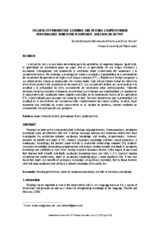Vocabulary knowledge learning and reading comprehension performance: which one is superior - breadth or depth?

View/
Author
Mohammadi, Seyed Mohammad
Afshar, Nasrollah Bayat
Publisher
Universidad de Córdoba, UCOPressDate
2016Subject
Reading performanceDepth of vocabulary knowledge
Breadth of vocabulary knowledge
Actuación lectora
Profundidad léxica
Amplitud léxica
METS:
Mostrar el registro METSPREMIS:
Mostrar el registro PREMISMetadata
Show full item recordAbstract
Reading has been and is a demanding task for foreign language learners. Correspondingly, vocabulary
knowledge plays an extremely vital role in foreign language learning and numerous researchers have
investigated the correlation between vocabulary knowledge and reading comprehension. However,
research on breadth and depth of EFL learners’ vocabulary knowledge and their mutual interactions is
inadequate. Accordingly, the present paper intends to review the relationships between EFL students’
vocabulary knowledge and reading comprehension and analyze whether breadth and depth of vocabulary
knowledge are correlated to each other. Having reviewed numerous studies in this regard, it was found
that whereas both breadth and depth vocabulary knowledge have vital roles in EFL learners' reading
comprehension performance, depth of vocabulary knowledge plays a more significant role. It was also
found that depth and breadth of vocabulary knowledge are positively correlated, that is, those learners
who had large vocabulary size will have a deeper knowledge of the words, too. La lectura ha sido y es una tarea demandada para los aprendices de segundas lenguas. Igualmente,
el aprendizaje de vocabulario juega un papel vital en el aprendizaje de una lengua extranjera y
numerosos investigadores han establecido la correlación entre conocimiento del vocabulario y la
comprensión lectora. Sin embargo, la investigación sobre la amplitud y la profundidad en el conocimiento
del vocabulario de aprendices de inglés como lengua extranjera (EFL – English as a Foreign Language) y
sus interacciones mutuas es inadecuada. De manera similar, este artículo intenta revisar las relaciones
entre el conocimiento del vocabulario de alumnado EFL y su comprensión lectora, así como analizar si la
amplitud y la profundidad de dicho conocimiento de vocabulario están correlacionadas. Habiendo
revisado numerosos estudios al respecto, encontramos que al tiempo que la profundidad y la amplitud en
el conocimiento del vocabulario tienen papeles esenciales en la comprensión lectora de los aprendices
EFL, la profundidad juega un papel más esencial, si cabe. También encontramos que la profundidad y la
amplitud en el conocimiento del vocabulario están correlacionadas de manera positiva, es decir, aquel
alumnado que mostraba un amplio conocimiento en el número de palabras, también mostraba un
conocimiento más profundo de esas palabras.
